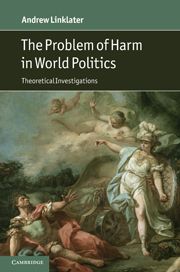Book contents
- Frontmatter
- Contents
- Preface
- Introduction
- 1 The concept of harm
- 2 The harm principle and global ethics
- 3 Harm and international relations theory
- 4 The sociology of civilizing processes
- 5 Historical sociology and world politics: structures, norms and emotions
- 6 Civilizing processes and international systems
- Conclusion
- Bibliography
- Index
4 - The sociology of civilizing processes
Published online by Cambridge University Press: 05 June 2012
- Frontmatter
- Contents
- Preface
- Introduction
- 1 The concept of harm
- 2 The harm principle and global ethics
- 3 Harm and international relations theory
- 4 The sociology of civilizing processes
- 5 Historical sociology and world politics: structures, norms and emotions
- 6 Civilizing processes and international systems
- Conclusion
- Bibliography
- Index
Summary
Thus far the discussion has analysed the various ways of harming and of being harmed within specific societies and in world politics. It has considered how a cosmopolitan harm principle can promote the humane governance of increasing interconnectedness. Attention then turned to leading theories of international relations, noting major differences about how far societies have progressed – or are likely to progress – in embedding the ‘principle of humaneness’ in global arrangements. Those theories offer competing interpretations of the prospects for, and constraints upon, such a development; they have discrepant accounts of the dominant forms of harm and their ultimate causes, and divergent interpretations of how to ameliorate or solve the problem of harm in world politics. The point has been reached where it is possible to begin to integrate earlier themes in a higher synthesis that aims to understand civilizing processes in international relations.
The importance of analysing such processes has been recognized by those English School writers who have referred to levels of ‘civility’ – and even to ‘civilizing processes’ – in world affairs (p. 128, n. 30). As far as the latter term is concerned, they have not engaged with the perspective that contributes most to such an inquiry – the standpoint of process sociology which was pioneered by Elias and developed by a small but increasingly influential body of scholars who have built on his work in recent years.
- Type
- Chapter
- Information
- The Problem of Harm in World PoliticsTheoretical Investigations, pp. 154 - 193Publisher: Cambridge University PressPrint publication year: 2011



